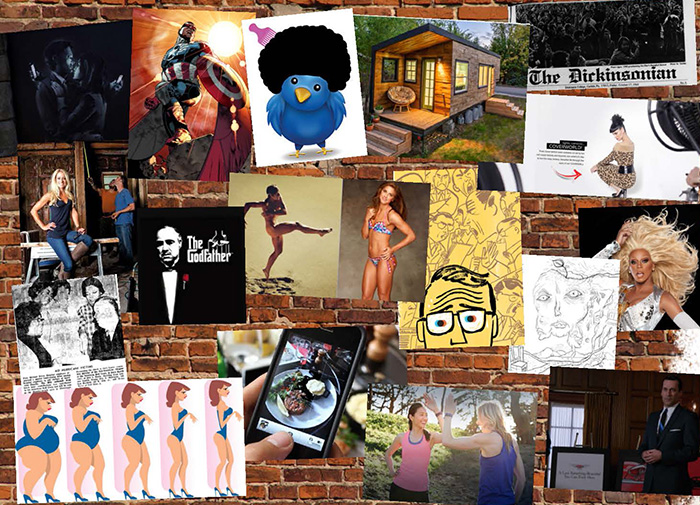Where RuPaul Meets Amazing-Man

Cover image from the 2015 American Studies Student Research Symposium program.
American-studies majors tap into national conversations during annual research symposium
by MaryAlice Bitts-Jackson
Senior American-studies majors bored deep into the complexities of American identity, experience and culture—often, from unexpected angles—during the recent American Studies Senior Research Symposium. The annual event highlights the most extensive research project of each student's undergraduate career.
The virtual world attracted scholarly attention during this year's symposium, as Celeste Hippolyte presented black Twitter as a cultural practice, Susannah May tackled the food-Instagram phenomenon and Hannah Glick turned a critical eye to dating in a social-network-saturated society. Rebecca Winsor, Meaghan Quirin and Sasha Reagan, meanwhile, delved into physical spaces. Winsor’s research tapped into a national conversation about home ownership in America, Quirin examined the Vietnam-protest movement at Dickinson, and Reagan analyzed the cultural phenomenon of dams.
Peering into issues relating to representation, Aaron Hock asked how the television show RuPaul’s Drag Race evades the politics of drag performance, and Tyler Drbal examined how comic books tackled issues of race during the Civil Rights era and beyond, using black superheroes like Amazing-Man as a vehicles for racial discourse. Fabian Hernandez studied the role of borders in the Mestizo consciousness, while Grace Morelli questioned how Italian-Americans are represented in film.
In their body- and gender-centered work, Katherine Dilworth examined the idealized, monitored body in the wake of Fitbit, Melissa Fallat interpreted the Weight Watchers-defined ideology of thinness, Heather Bonello took on diversity in consumer and celebrity culture, and Alexandra Young applied the gender binary to U.S. women’s soccer stars. On the opposite side of the gendered coin, Quinn Cotter and Larry Jolon tackled shifting male identities through their analyses of midcentury Playboy consumer culture and anxiety in men’s memoirs, respectively, while Johanna Fleming placed women in a traditionally male context by studying the intersections of women and power tools in popular culture.
The presentations were part of the students’ senior seminar, a yearlong course that brings senior-year students in the same major together as they complete their final projects and theses. It’s a greenhouse of sorts, said Glick, a place where shared ideas—and possibly the seeds of future graduate-level work—can grow.
“As we constantly edit our topics and papers, we learn exactly what the [academic-research] process is like,” Glick explained.
“The constant feedback from my peers also has helped me to focus and frame my ideas and research in order to create what I hope to be an excellent capstone to my American-studies career,” Drbal added.
Learn more
- Department of American Studies
- “From A(DHD) to Z(umba Gear)”
- “Barks and Beetle Guts”
- Interdisciplinary Studies
- Research at Dickinson
- Students as Scholars
- Latest News
Published March 9, 2015